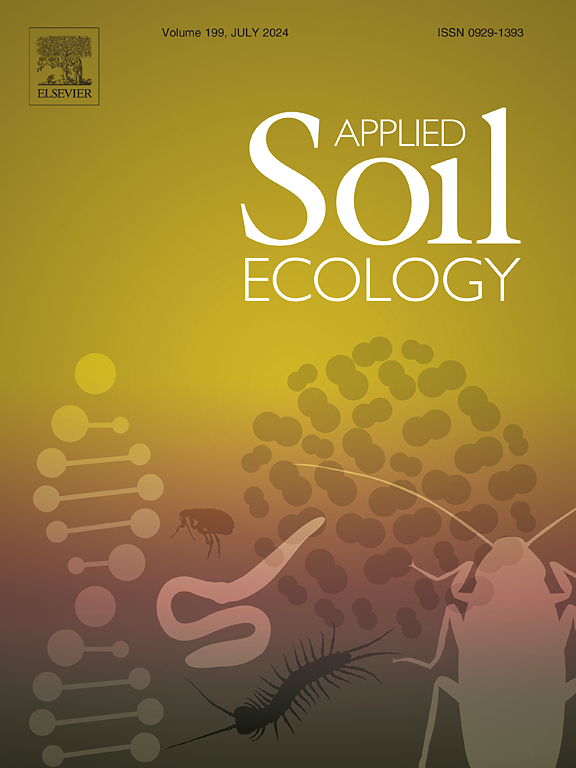PGPR与有机肥对盐碱稻系统土壤肥力、酶活性和微生物群落组成的协同效应
IF 5
2区 农林科学
Q1 SOIL SCIENCE
引用次数: 0
摘要
土壤盐碱化是全球农业生产力和粮食安全面临的重大挑战。本研究探讨了植物促生菌(PGPR)与有机肥在水稻盐碱地修复中的协同效应。从盐碱地水稻根际分离到4株耐盐PGPR菌株芽孢杆菌RM-1/RM-2、曲霉sp. SV-1和青霉sp. sv -2,分别与灭菌(SOF)和未灭菌(UOF)牛粪堆肥结合。在轻度(1.0% Na2CO3)和中度(1.5% Na2CO3)盐胁迫下的水稻栽培试验表明,UOF + PGPR处理显著提高了灌浆期土壤肥力和酶活性。在中等盐度条件下,与对照相比,UOF + PGPR使土壤有机质增加218.99%,速效钾增加1036.20%,速效磷增加563.13%,过氧化氢酶活性增加100.00%,脲酶活性增加340.98%,蔗糖酶活性增加251.03%。微生物群落分析表明,PGPR配施有机肥降低了酸杆菌门(Acidobacterium)的丰度,提高了厚壁菌门(Firmicutes)、拟杆菌门(Bacteroidetes)和子囊菌门(Ascomycota)的相对丰度,降低了土壤盐分,提高了土壤养分含量,最终提高了水稻产量。本研究介绍了一种创新的pgpr -有机肥配方,该配方不仅能增强原生微生物功能,还能降低土壤pH值和可溶性盐积累。然而,这些发现目前仅限于受控的盆栽实验。进一步的研究需要在野外条件下验证这些结果并评估长期生态影响。我们建议在盐碱化地区进行大规模的UOF + PGPR组合田间试验,开发具有抗旱和重金属修复特性的作物特异性PGPR联盟,并建立土壤健康监测方案,以跟踪碳固存和盐的再积累。本文章由计算机程序翻译,如有差异,请以英文原文为准。

Synergistic effects of PGPR and organic fertilizer on soil fertility, enzyme activities, and microbial community composition in saline-alkali rice systems
Soil salinization presents a significant global challenge to agricultural productivity and food security. This study explores the synergistic effects of plant growth-promoting rhizobacteria (PGPR) and organic fertilizer in remediating saline-alkali soils for rice cultivation. Four salt-tolerant PGPR strains—Bacillus sp. RM-1/RM-2, Aspergillus sp. SV-1, and Penicillium sp. SV-2—were isolated from the rice rhizosphere in saline-alkali soils and combined with either sterilized (SOF) or unsterilized (UOF) cow manure compost. Rice cultivation experiments under mild (1.0 % Na2CO3) and moderate (1.5 % Na2CO3) salinity stress demonstrated that the UOF + PGPR treatment significantly improved soil fertility and enzyme activities during the grain-filling stage. Compared to the control, UOF + PGPR increased soil organic matter by 218.99 %, available potassium by 1036.20 %, available phosphorus by 563.13 %, catalase activity by 100.00 %, urease activity by 340.98 %, and sucrase activity by 251.03 % under moderate salinity conditions. Microbial community analysis revealed that PGPR combined with organic fertilizer reduced the abundance of Acidobacterium while increasing the relative abundance of Firmicutes, Bacteroidetes, and Ascomycota, leading to decreased soil salinity and enhanced soil nutrient content, ultimately improving rice productivity. This study introduces an innovative PGPR-organic fertilizer formulation that not only enhances native microbial functions but also reduces soil pH and soluble salt accumulation. However, the findings are currently limited to controlled pot experiments. Further research is necessary to validate these results in field conditions and assess long-term ecological impacts. We recommend large-scale field trials of the UOF + PGPR combination in salinized areas, the development of crop-specific PGPR consortia with drought resistance and heavy metal remediation properties, and the establishment of soil health monitoring protocols to track carbon sequestration and salt reaccumulation over time.
求助全文
通过发布文献求助,成功后即可免费获取论文全文。
去求助
来源期刊

Applied Soil Ecology
农林科学-土壤科学
CiteScore
9.70
自引率
4.20%
发文量
363
审稿时长
5.3 months
期刊介绍:
Applied Soil Ecology addresses the role of soil organisms and their interactions in relation to: sustainability and productivity, nutrient cycling and other soil processes, the maintenance of soil functions, the impact of human activities on soil ecosystems and bio(techno)logical control of soil-inhabiting pests, diseases and weeds.
 求助内容:
求助内容: 应助结果提醒方式:
应助结果提醒方式:


